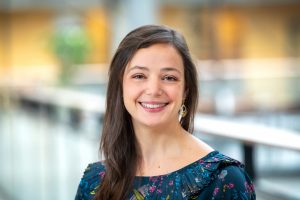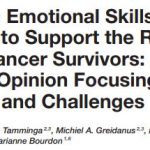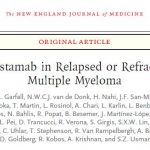Welcome to Sara Gandolfi, post-doctoral researcher in cell biology at SIRIC ILIAD!
Since May 2022, Sara Gandolfi has joined the ranks of the SIRIC ILIAD teams as a post-doctoral researcher. She has joined team 11 of the CRCI²NA, to study a bone marrow cancer, multiple myeloma.

Originally from Italy, Sara Gandolfi has travelled extensively in recent years. After studying medicine and completing her internship in Milan, she headed to Boston, where she joined the Dana Farber Cancer Institute, a cancer care and research centre. For five years, Sara studied haematological cancers, including multiple myeloma, a cancer of the bone marrow. Then, to continue her specialisation in the mechanisms of resistance to treatment and in immunology, she moved to Finland, to the University of Helsinki.
Last destination: Nantes, France
« I have always been very interested in studying multiple myeloma. I was looking for a research laboratory and applied to Professor Philippe Moreau, whose work on multiple myeloma is internationally well known » Sara Gandolfi
In May 2022, Sara finally settled in Nantes, and more specifically at the CRCI²NA, a laboratory that works in close collaboration with the clinical research studies of Prof. Philippe Moreau, in the framework of the SIRIC ILIAD project. Sara was welcomed as a post-doctoral researcher in team 11, directed by Catherine Pellat, where she found her research theme and the desire to develop her research projects with the team.
Focus on immune cells: NK cells …
« The first step in my work consists of confirming the results of my work on NK cells. » Sara Gandolfi
Natural Killer (NK) cells are cells of the immune system, which make up 5-18% of lymphocytes1. Unlike other cells, NK cells can directly identify and eliminate virus-infected cells or cancer cells.
1Lymphocyte: A variety of white blood cells (or leukocytes) involved in the body’s self defence responses. (Source: INCa)
In multiple myeloma, the immune system of patients is weakened or immunosuppressed. The body then produces fewer immune cells.
« The aim of my work is to strengthen the immune system of patients via NK cells from non-diseased donors » Sara Gandolfi
As a continuation of this work, Sara is studying within the SIRIC ILIAD the response of multiple myeloma cells of patients, when exposed to NK cells from several donors, in order to evaluate the differences in interaction with tumour cells.
« The aim is to improve the efficiency of NK cells by identifying the most suitable donors and therefore the most reactive NK cells to destroy tumour cells » Sara Gandolfi
… in order to develop new treatments
There are currently several treatments for multiple myeloma, including immunotherapy2 based on the properties of T lymphocytes3 (bispecific antibodies, CAR-T cells, etc.). For patients who do not respond, or respond only slightly to these therapies, the interest of NK cells is to offer them an alternative or a complement to other drugs.
«I am also continuing to work with my Finnish colleagues to identify molecules that, when used in parallel with NK cells, could improve their effectiveness. » Sara Gandolfi
2Immunotherapy: A treatment that stimulates the body’s own immune defences against cancer cells. (Source : INCa)
3T Lymphocyte: A lymphocyte that plays an important role in the adaptive immune response. “T” is an abbreviation for thymus, the organ in which their development is completed.
Helping patients: the ultimate role of research
« Research must answer practical and concrete questions and have an impact on patients. » Sara Gandolfi
Sara’s ambition is to work both in research and in the clinic. Her wish is to identify the urgent questions of patients and answer them in the laboratory, but not only:
« The whole point of translational research is to transfer and apply the results of research to clinical practice, where patients need them most » Sara Gandolfi



